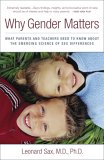Summary | Excerpt | Reviews | Beyond the Book | Readalikes | Genres & Themes | Author Bio
What Parents and Teachers Need to Know about the Emerging Science of Sex Differences
by Leonard Sax

Critics' Opinion:
Readers' Opinion:
First Published:
Feb 2005, 320 pages
Paperback:
Feb 2006, 336 pages
 Book Reviewed by:
Book Reviewed by:
BookBrowse Review Team
Buy This Book
In another seminar my fellow graduate students and I learned about the extraordinary work of Professor John Money at Johns Hopkins. Professor Money had been consulted by the parents of an unfortunate little boy whose penis had literally been sizzled off during a botched circumcision. At Dr. Money's recommendation, the boy had been raised as a girl, with excellent results (according to Dr. Money). The child loved to play dress-up, enjoyed helping Mom in the kitchen, and disdained "boy toys" such as guns or trucks. "Dr. Money's work provides further evidence that most of the differences we observe between girls and boys are socially constructed," professor Henry Gleitman told us. "We reward children who follow the sex roles we create for them while we penalize or at least fail to reward children who don't conform. Parents create and reinforce the differences we observe between girls and boys."
We nodded sagely. In clinical rotations we often encountered parents who still clung to the quaint notion that girls and boys were different from birth. But we knew better.
Or so we thought.
When I left Philadelphia to begin my residency in family practice, I threw out most of the papers I had accumulated during my six years at the University of Pennsylvania. Stacks of photocopied scientific papers had to go out in the trash. But there was one manila folder I didn't throw out, a folder containing a series of studies done by Professor John Corso at Penn State during the 1950s and 1960s, demonstrating that females hear better than males.
Four years later, after I finished my residency, my wife and I established a family practice in Montgomery County, Maryland, just outside of Washington, D.C. Years passed. I wasn't thinking much about gender differences. Then in the mid-1990s, I began to notice a parade of second- and third-grade boys marching into my office, their parents clutching a note from the school. The notes read: "We're concerned that Justin [or Juan or Michael or Tyrone] may have attention deficit disorder. Please evaluate."
In some of these cases I found that what these boys needed wasn't drugs for ADD, but rather a teacher who understood the hardwired differences in how girls and boys learn. Upon further inquiry, I found that nobody at the school was aware of gender differences in the ability to hear. I reread Professor Corso's papers, which documented that boys don't hear as well as girls. In the next chapter we'll look more closely at evidence for gender differences in hearing.
Think about the typical second-grade classroom. Imagine Justin, six years old, sitting at the back of the class. The teacher, a woman, is speaking in a tone of voice that seems about right to her. Justin barely hears her. Instead, he's staring out the window, or watching a fly crawl across the ceiling. The teacher notices that Justin isn't paying attention. Justin is demonstrating a deficit of attention. The teacher may reasonably wonder whether Justin perhaps has attention deficit disorder.
The teacher is absolutely right about Justin showing a deficit of attention. But his attention deficit isn't due to "attention deficit disorder," it's due to the fact that Justin can barely hear the soft-spoken teacher. The teacher is talking in a tone of voice that is comfortable to her and to the girls in the class, but some of the boys are practically falling asleep. In some cases we might be able to fix the problem simply by putting the boy in the front row.
Once, after I had done such an evaluation and made my recommendations, the parents told me that the school had advised them to seek a second opinion. "It's not that we don't trust you, Dr. Sax," Mom said. "It's just that the school really thinks we should get an opinion from an expert."
I soon learned that the only doctors that this particular school considered to be "experts" were doctors who always prescribed medication. Curious to know whether my experience was unique, I obtained funding from the American Academy of Family Physicians to survey all the doctors in the Washington area. Our survey basically asked one simple question: Who first suggests the diagnosis of ADD? The results: in the majority of cases the diagnosis of ADD is made by the teacher. Not by the parents, nor the neighbors, nor the doctor.
Excerpted from Why Gender Matters by Leonard Sax, M.D., Ph.D. Copyright © 2005 by Leonard Sax, M.D., Ph.D.. Excerpted by permission of Broadway, a division of Random House, Inc. All rights reserved. No part of this excerpt may be reproduced or reprinted without permission in writing from the publisher.





The Flower Sisters
by Michelle Collins Anderson
From the new Fannie Flagg of the Ozarks, a richly-woven story of family, forgiveness, and reinvention.

The House on Biscayne Bay
by Chanel Cleeton
As death stalks a gothic mansion in Miami, the lives of two women intertwine as the past and present collide.

The Funeral Cryer by Wenyan Lu
Debut novelist Wenyan Lu brings us this witty yet profound story about one woman's midlife reawakening in contemporary rural China.
Your guide toexceptional books
BookBrowse seeks out and recommends the best in contemporary fiction and nonfiction—books that not only engage and entertain but also deepen our understanding of ourselves and the world around us.